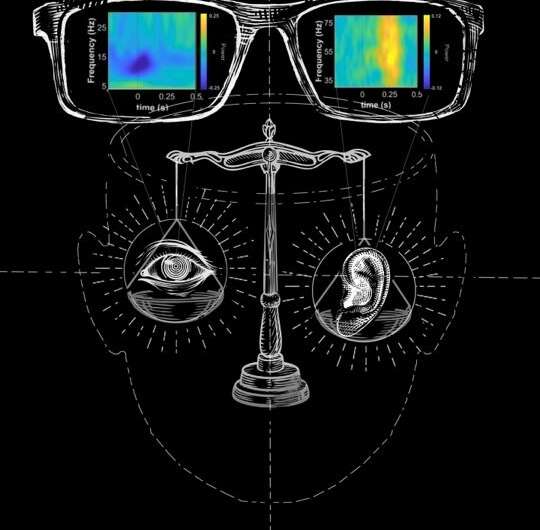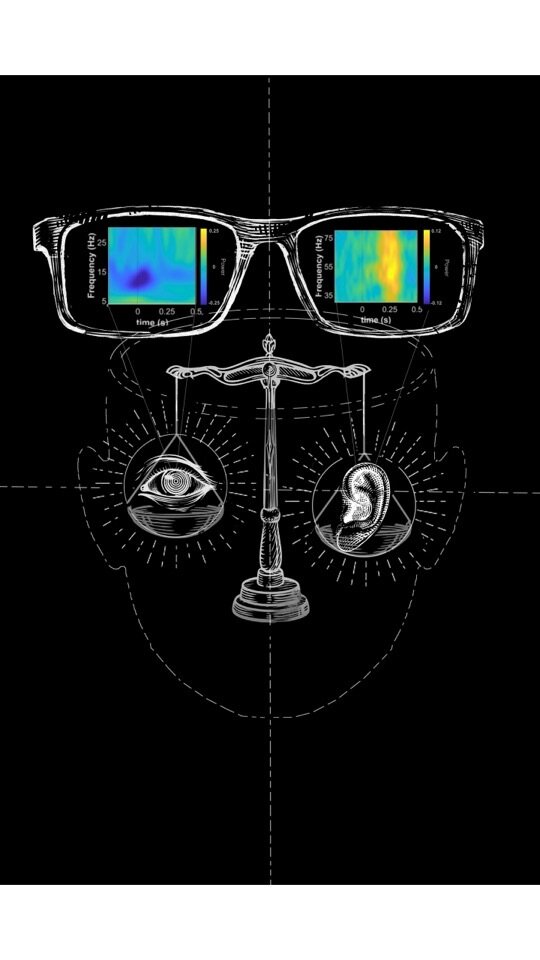
The senses represent our gates to receive information from the environment, but not all of them are always available for everyone, as in the case of blind or deaf people. Researchers know today quite well that the brain has the critical ability to adapt to different sensory experiences and, in some ways, to “compensate” for the lack of one sense or the other.
In a recent study, a group of researchers from the IMT School for Advanced Studies Lucca (Italy), in collaboration with a group from the University of Ulm (Germany), added new insights on how the brain manages to adapt to changes in the flux of information coming from eyes and ears.
Several studies have already shown that the lack of sight, even for a short period of time, for example through the occlusion of one eye for a few hours, is sufficient to induce a temporary change in how the brain processes visual information. Yet, it was unknown whether these plastic effects have an impact on other senses beyond vision, and influence their activity.
For this new study, the researchers from the MOMiLab (Molecular Mind Laboratory) of the IMT School blindfolded the eye of 20 participants to the experiment, and asked them to look and count simple flashes of light while sound beeps were also presented. During the experiment, the activity in the brain was registered with millisecond precision with the electroencephalogram. The researchers observed that neural activity in response to visual and auditory input was altered following the eye patch removal.
“In this research, we demonstrated for the first time that even a short period of monocular deprivation—the occlusion of one eye with an eye patch for about two hours—also affects auditory processing. In particular, we observed a very selective increase of neural response to sounds,” says Alessandra Federici, a researcher in cognitive neuroscience at the IMT School, and first author of the paper.
In other words, even a small perturbation of visual experience is enough to induce a change in the balance between vision and audition. Indeed, the effects of monocular deprivation were paradoxical: after patch removal, the brain became more sensitive to the visual information provided by the eye that was occluded, as if the lack of input led to an increase in neural excitability.
The brain also became more susceptible to auditory input, but selectively when the environment was monitored with the other, non-patched, eye. “While many studies have demonstrated the plasticity of the senses after prolonged sensory deprivation, as in the case of blindness and deafness, these findings unveil the high degree of plasticity and interdependence of the senses and the profound impact that sensory experience continuously exerts on our brain,” says Davide Bottari, researcher at the IMT School and principal investigator of the study.
This confirms that the brain has a very important capacity to adapt to changes in the input it receives. It unequivocally shows that changes in one sense quickly lead to changes in others, as if a new equilibrium would be found. It also offers possible indications on how to take into consideration this sensory interplay to design more efficient protocols of rehabilitation for different kinds of diseases and disabilities, such as amblyopia.
The research is published in the journal NeuroImage.
More information:
Alessandra Federici et al, Crossmodal plasticity following short-term monocular deprivation, NeuroImage (2023). DOI: 10.1016/j.neuroimage.2023.120141
Journal information:
NeuroImage
Source: Read Full Article
